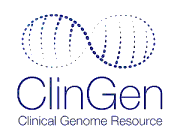The ClinGen Evidence Repository is an FDA-recognized human genetic variant database containing expert-curated assertions regarding variants' pathogenicity and supporting evidence summaries.
[Disclaimer]
- No ClinVar Id was directly found from the curated document
- ClinVar Id was derived from the Allele Registry.
- No CSPEC related information was provided by the message!
- See Evidence submitted by expert panel for details.
Variant: NM_001306179.2:c.58G>C
- Curation Version - 1.0
- Curation History
- JSON LD for Version 1.0
CA386952573
1327599 (ClinVar)
Gene: HNF1A
Condition: monogenic diabetes
Inheritance Mode: Autosomal dominant inheritance
UUID: 7d6401b1-eb48-47e6-bb85-5d49afa7a19f
Approved on: 2021-08-18
Published on: 2021-10-29
HGVS expressions
NM_001306179.2:c.58G>C
NC_000012.12:g.120978826G>C
CM000674.2:g.120978826G>C
NC_000012.11:g.121416629G>C
CM000674.1:g.121416629G>C
NC_000012.10:g.119901012G>C
NG_011731.2:g.5081G>C
ENST00000257555.11:c.58G>C
ENST00000257555.10:c.58G>C
ENST00000400024.6:c.58G>C
ENST00000402929.5:n.193G>C
ENST00000535955.5:n.42+134G>C
ENST00000538626.2:n.176G>C
ENST00000538646.5:c.58G>C
ENST00000540108.1:c.58G>C
ENST00000541395.5:c.58G>C
ENST00000541924.5:c.58G>C
ENST00000543427.5:c.58G>C
ENST00000544413.2:c.58G>C
ENST00000544574.5:c.58G>C
ENST00000560968.5:n.201G>C
ENST00000615446.4:c.-258+115G>C
ENST00000617366.4:c.58G>C
NM_000545.5:c.58G>C
NM_000545.6:c.58G>C
NM_001306179.1:c.58G>C
NM_000545.8:c.58G>C
NM_000545.8(HNF1A):c.58G>C (p.Gly20Arg)
More
Evidence submitted by expert panel
The information on this website is not intended for direct diagnostic use or medical decision-making without review by a genetics professional. Individuals should not change their health behavior solely on the basis of information contained on this website. If you have questions about the information contained on this website, please see a health care professional.
